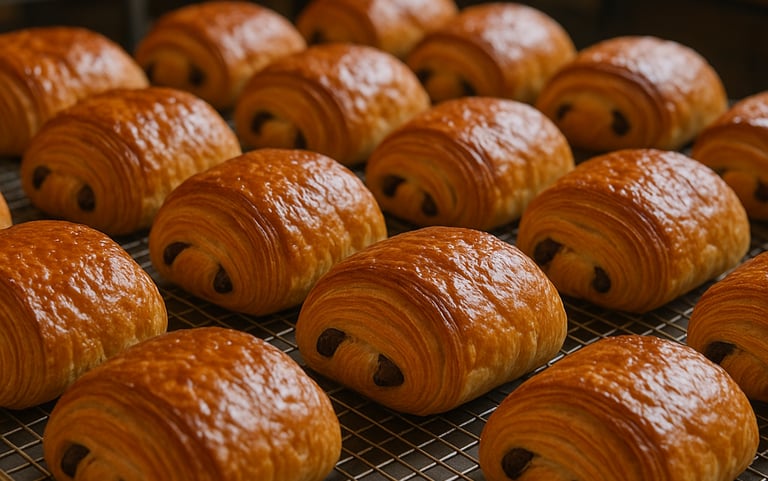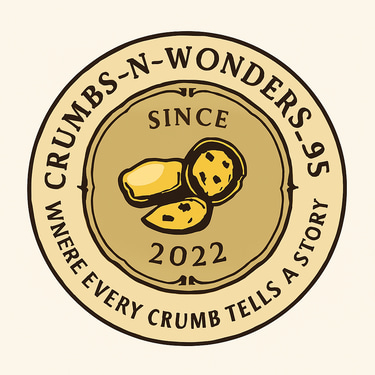Peace and the Pain au Chocolate
Jean, once an aid worker, now a baker, discovers how pain au chocolat teaches him to be a peacemaker, layering sweetness into a broken, bitter world.
BEATITUDES
Wandering Armenian
8/21/20255 min read


Peace and the Pain au Chocolate
The first tear fell before Jean even realized he was crying.
It landed on the marble counter with a soft plip, right beside the chocolate he was supposed to be folding into croissant dough. His hands—scarred from years of breaking up fights, calloused from kneading bread—trembled as he wiped his eyes with the back of his wrist.
Not again. Not today.
But the memories came anyway, flooding in like water through a cracked dam. The sound of children crying in the refugee camp. The metallic smell of blood on hot sand. His own voice, cracked and desperate, pleading with two fathers to put down their makeshift weapons, to think of their families, to just stop- "Why did I leave them?" The words escaped as barely a whisper, but in the pre-dawn silence of his bakery, they felt like a confession shouted from the rooftops.
Jean's chest constricted with that familiar ache—the one that lived just beneath his ribs, pulsing with guilt and shame. He had told everyone it was burnout. Told himself it was wisdom, stepping back before he broke completely. But standing here, surrounded by the sweet smell of rising dough and the gentle warmth of his ovens, the truth sat heavy on his shoulders: he had run. Plain and simple. When the darkness got too thick, when the violence became too much, when he started seeing his own anger reflected in the eyes of those he was trying to help—he had run.
The chocolate melted slightly between his fingers. He had been gripping it too tightly, his knuckles white with tension.
Some peacemakers you turned out to be.
He set the chocolate down and reached for his Bible, pages soft and worn from desperate midnight searches for something—anything—that might make sense of the mess he had made of his calling. The leather binding felt warm in his hands, familiar as his own heartbeat. His fingers found the page without looking, muscle memory guiding him to the words that had haunted him for months.
"Blessed are the peacemakers, for they will be called children of God." Matthew 5:9.
The words used to fill him with purpose. Now they felt like an accusation.
Jean laughed bitterly, the sound harsh in the gentle quiet of his kitchen. "Children of God," he muttered. "What kind of child abandons his family when they need him most?"
His vision blurred again, and this time he did not try to stop the tears. They came hot and fast, carrying with them the weight of every person he had left behind, every conflict he had walked away from, every moment he had chosen his own safety over their need for peace.
The timer chimed, startling him back to the present. The dough was ready.
Jean stared down at the pale, buttery layers he had prepared earlier, then at the dark chocolate waiting to be folded inside. His breathing slowed as he watched a drop of moisture from his eyes fall onto the dough, creating a tiny, stained spot that the pastry absorbed without protest.
Something stirred in his chest. Not peace—not yet—but a whisper of understanding.
He picked up the chocolate again, this time cradling it gently. Dark. Uncompromising. Bitter if eaten alone. But when he placed it carefully onto the dough and began to fold the pale layers around it, something beautiful happened. The dough did not fight the chocolate or try to change it. It simply embraced it, held it, transformed it through patient, gentle pressure into something new.
"Oh," Jean breathed, his hands stilling on the pastry.
The realization hit him like sunrise after the longest night: he had been trying to eliminate the darkness instead of embracing it. In the camps, he had fought against anger, desperation, the bitter reality of human suffering as if these emotions were enemies to be defeated. But what if—what if they were simply meant to be held? Folded into layers of compassion, patience, forgiveness?
What if peace was not about stopping the storm, but about learning to dance in the rain?
Jean's hands began to move again, rolling the dough with newfound reverence. Each fold felt like a prayer; each turn a small act of faith. The chocolate remained dark within the pale embrace of butter and flour—honest, real, unchanged in its essence but transformed by what surrounded it.
"Maybe that's what You were trying to teach me," he whispered to the empty kitchen, his voice thick with emotion. "Not to fix everyone's pain, but to hold it. To wrap it in love until it becomes something beautiful."
The thought terrified and thrilled him in equal measure. It meant the Henderson family down the street—whose marriage was fracturing so loudly the whole neighbourhood could hear—did not need him to solve their problems. They needed him to witness their pain, to sit with them in their darkness without trying to chase it away.
When the pastries came out of the oven forty minutes later, golden, and perfect, one had split open slightly, revealing the molten chocolate heart within. Jean broke off a piece and took a bite, closing his eyes as warmth spread across his tongue. The sweetness and richness mingled perfectly, each flavor made more beautiful by the presence of the other.
His throat tightened with emotion—not the familiar ache of shame this time, but something warmer. Hope. Or recognition. The taste of purpose rediscovered.
Without hesitation, Jean began packing the warm pastries into his nicest box, each one a small act of rebellion against despair, a tiny prayer wrapped in flaky pastry. His hands still shook slightly-they would but his heart felt steadier than it had in months.
Standing on the Henderson's front porch, box in hand, Jean pressed his forehead against their door and whispered the words that wanted to come home: "Blessed are the peacemakers, for they will be called children of God."
The irony was not lost on him. Here he was, a failed aid worker turned baker, standing on a suburban doorstep with pastries instead of peace treaties. But as he lifted his hand to knock, Jean felt something shift deep in his chest—the final loosening of a knot he had carried for far too long.
Maybe he could not stop wars. Maybe he could not heal nations or guarantee that these neighbours would even open their door. But he could keep folding peace into the everyday fractures of this world, one gentle act at a time, trusting that love—like chocolate in warm dough—would eventually soften even the hardest places.
As his knuckles connected with the wood, Jean smiled through his tears. He was exactly where God wanted him to be not perfect, not fearless, but willing. A peacemaker learning that sometimes the most profound revolutions begin not in boardrooms or battlefields, but in kitchens, with flour-dusted hands and a heart brave enough to try again.
The door opened, and Jean looked into Mrs. Henderson's tired, suspicious eyes with all the compassion he'd once brought to refugee camps, all the patience he'd learned from kneading dough, all the hope that came from understanding that peace wasn't about eliminating the bitter—it was about learning to hold it with love.

